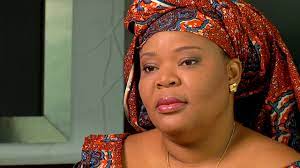
Leymah Gbowee
I once heard the photographer Harry Mattison discuss the difficulty, the near impossibility, of photographing peace. For Mattison, an award winning photographer of conflict, this was an epiphany. Peace is difficult, representing peace is near impossible.
The Nobel Prize Committee today awarded the Peace Prize to three women, Ellen Johnson Sirleaf, of Liberia; Leymah Gbowee, from Liberia and currently based in Ghana; and Tawakul Karman, of Yemen. First, congratulations to all, and thanks to the Nobel Committee for not repeating the mistakes of recent Peace Prize recipients (Barack Obama, the proponent of “just war”, for example). Thanks to the Nobel Committee for increasing the pool of living women Nobel Peace Prize winners by a whopping 50%. Where there were six, now there are nine. Good news, hopefully, for the Nobel Women’s Initiative … and the world. (Since its inception, in 1901, 15 women have won the Peace Prize.)
The New York Times coverage of the announcement, and its implications, suggests the truth of Mattison’s epiphany. The Times devotes 33 paragraphs to the news, a substantial article. Johnson Sirleaf gets eleven paragraphs, large chunks early on and then again at the end. Karman receives five paragraphs, which begin about a third of the way into the piece. Gbowee receives a scant three paragraphs, and they don’t show up until the 24th paragraph. You have to want to read the whole article to find out who Leymah Gbowee is.
Leymah Gbowee is a “militant pacifist”, a “peace activist”, and a real mover and shaker. She is a woman who recognized that women had to organize, across all barriers and across all divisions, that women had to transform themselves and one another if they wanted to change the world. They had to learn to participate in peace negotiations, for example, by refusing the symbolic chairs and other morsels offered them, by confronting the materiel of war and violence with the human force of peace, compassion, and love. When the Big Men of Liberia met in Accra to negotiate “peace”, Gbowee and her sisters in white t-shirts raised a ruckus outside, and just about held the delegates hostage.
From the outset, Leymah Gbowee identified humanity as the site of her struggles and organizing. That means organizing structures, such as the Women of Liberia Mass Action for Peace, followed by the Women In Peacebuilding Network, or WIPNET. From there, she has gone on to organize the Women Peace and Security Network Africa, based in Ghana. Gbowee’s vision of women is African, from Cape to Cairo, and from coast to coast.
Peace and justice, child by child, person by person, space by space, and beyond. That’s what Leymah Gbowee has been organizing. That’s what is so difficult, if not impossible, to represent. That’s what The New York Times missed. But you don’t have to. On Tuesday, October 18, in the United States, PBS will broadcast the documentary, Pray the Devil Back to Hell, about the work of Leymah Gbowee. Don’t miss it. It’s inspiring, as is its subject.

(This starts a new collaboration with Africa Is a Country. This post originally appeared, under different title, here)